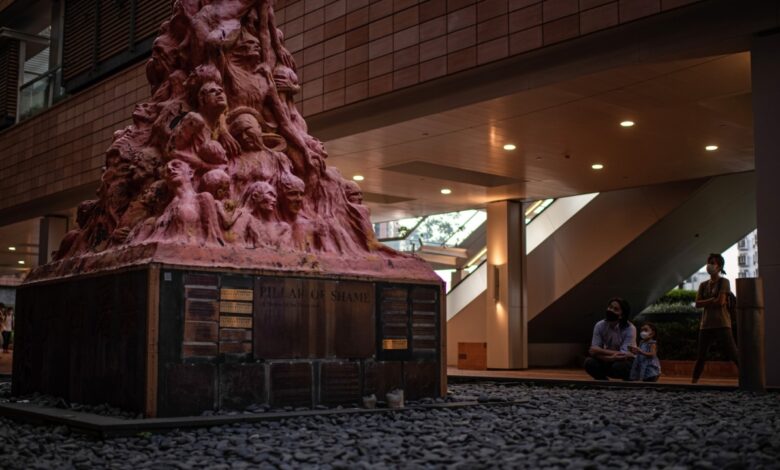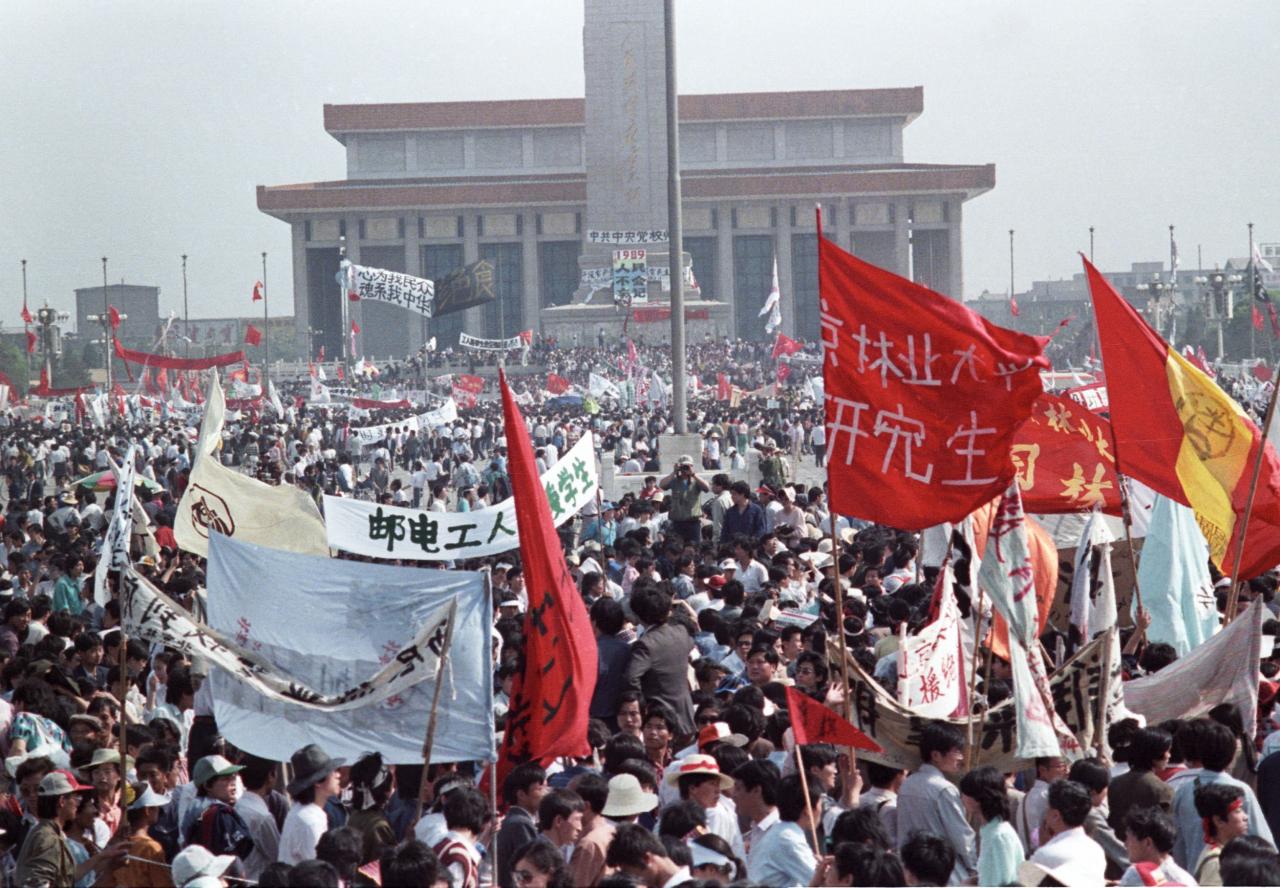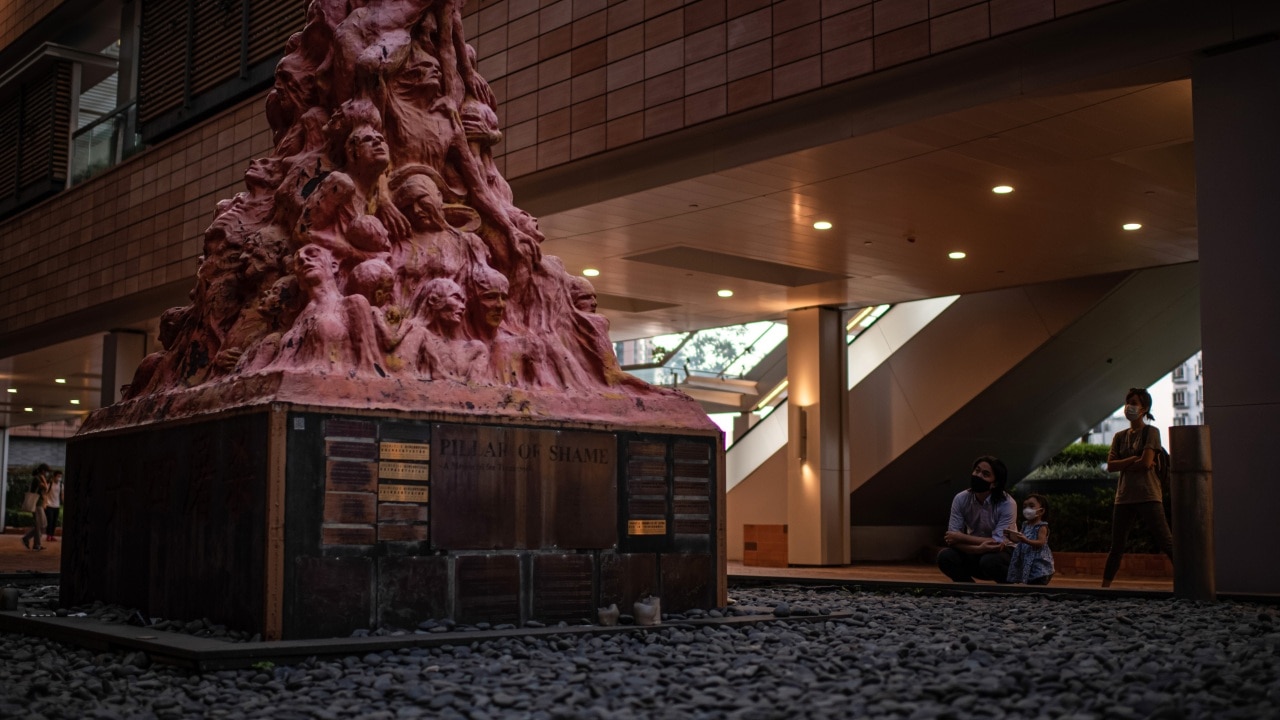
Hong Kong Smothers Dissent Ahead of Tiananmen Anniversary
Hong Kong smothers dissent ahead of the Tiananmen anniversary – a chilling reality. This year, the anniversary of the Tiananmen Square protests is once again shrouded in a heavy blanket of censorship and fear. The Hong Kong government, under pressure from Beijing, is cracking down harder than ever on any expression of dissent, using the controversial National Security Law as its weapon.
This isn’t just about preventing protests; it’s about silencing any memory, any discussion, any whisper of challenge to the established order. It’s a story of escalating repression, international concern, and the struggle for freedom in a city once known for its vibrancy and outspokenness.
The National Security Law, enacted in 2020, has fundamentally reshaped Hong Kong’s political landscape. Its vaguely worded provisions allow authorities to target anyone deemed a threat to national security, effectively stifling free speech and assembly. We’ll explore specific examples of how this law has been used to silence activists, journalists, and ordinary citizens who dare to express views that differ from the government line.
The upcoming Tiananmen anniversary serves as a stark reminder of the ongoing struggle for democracy and freedom in Hong Kong, a struggle that’s being fought under increasingly oppressive conditions.
Methods of Dissent Suppression in Hong Kong

The erosion of freedoms in Hong Kong has been a deeply concerning trend in recent years, marked by a systematic tightening of control over dissent. The methods employed by authorities are multifaceted, ranging from highly visible arrests to subtle forms of censorship and pervasive surveillance, effectively chilling free speech and political participation. This chilling effect has profoundly impacted Hong Kong’s vibrant civil society and its ability to engage in open political discourse.
Arrests and Prosecutions of Activists
The Hong Kong government has increasingly used the legal system to suppress dissent. The National Security Law, enacted in 2020, provides a broad framework for prosecuting individuals deemed to be engaging in secession, subversion, terrorism, or collusion with foreign forces. This law has been utilized to target prominent activists, journalists, and politicians, leading to lengthy prison sentences and restrictions on their freedoms.
The vaguely worded provisions of the law allow for arbitrary interpretations, further exacerbating the chilling effect on free speech. These prosecutions often involve lengthy trials with limited access to legal representation, raising concerns about due process.
Censorship and Control of Information
The suppression of dissent in Hong Kong extends beyond arrests to include a significant crackdown on freedom of expression. This includes censorship of online content, restrictions on media outlets, and the self-censorship practiced by many individuals and organizations fearing repercussions. Websites and social media platforms are routinely monitored, and content deemed critical of the government is often removed or blocked.
Journalists face increasing pressure, with some choosing self-exile to avoid prosecution or harassment. The chilling effect of this censorship is evident in the decline of critical voices in the public sphere.
Surveillance and Monitoring of Citizens
The Hong Kong government has implemented extensive surveillance technologies to monitor the activities of its citizens. This includes the use of facial recognition technology, CCTV cameras, and data collection from various online platforms. This pervasive surveillance creates an environment of fear and self-censorship, as individuals are aware that their actions and opinions are being constantly monitored. This constant surveillance discourages open dissent and limits the ability of citizens to freely express their political views without fear of reprisal.
Timeline of Repressive Measures
A clear escalation of repressive measures against dissent in Hong Kong is observable:
- 2019: The Anti-Extradition Law protests demonstrate widespread dissent, met with increasingly forceful police responses.
- 2020: The National Security Law is enacted, significantly restricting freedoms of speech, assembly, and the press.
- 2021: A significant number of pro-democracy activists are arrested and charged under the National Security Law, including prominent figures like Jimmy Lai and Joshua Wong.
- 2022-Present: The crackdown continues with ongoing arrests, prosecutions, and increased censorship, further limiting the space for political opposition.
Prominent Activists Arrested or Silenced
The following are just a few examples of individuals who have faced arrest, imprisonment, or silencing for their activism:
- Jimmy Lai: Media tycoon and prominent pro-democracy activist, sentenced to lengthy imprisonment.
- Joshua Wong: High-profile activist, imprisoned for his role in pro-democracy protests.
- Agnes Chow: Activist and former member of Demosistō, imprisoned for her participation in protests.
- Many others: Numerous lesser-known activists, journalists, and politicians have also been arrested or silenced, highlighting the broad scope of the repression.
Impact on the Expression of Political Views, Hong kong smothers dissent ahead of the tiananmen anniversary
The combined effect of arrests, censorship, and surveillance has severely curtailed the ability of Hong Kong citizens to express their political views freely. The fear of reprisal, both legal and extra-legal, has created a climate of self-censorship, limiting open discussion and debate on important political issues. This erosion of freedom of expression is a significant threat to Hong Kong’s democratic values and its future as a vibrant and free society.
The shrinking space for dissent has effectively silenced many voices and constrained the ability of citizens to hold their government accountable.
International Response to Hong Kong’s Crackdown: Hong Kong Smothers Dissent Ahead Of The Tiananmen Anniversary

The international community’s response to the crackdown on dissent in Hong Kong has been varied and complex, reflecting differing geopolitical priorities and domestic political considerations. While some nations have condemned the actions of the Hong Kong and Chinese governments forcefully, others have adopted a more muted approach, prioritizing economic ties over human rights concerns. The effectiveness of this international pressure remains a subject of ongoing debate.
Differing International Responses
The responses from different countries and international organizations have ranged significantly. Western democracies, including the United States, United Kingdom, Canada, and Australia, have been the most vocal in their criticism, issuing strong statements condemning the erosion of Hong Kong’s autonomy and human rights. These criticisms have often been accompanied by sanctions targeting individuals and entities deemed responsible for suppressing dissent.
In contrast, some countries, particularly those with significant economic ties to China, have adopted a more cautious approach, often refraining from direct condemnation or opting for diplomatic engagement behind closed doors. International organizations like the United Nations Human Rights Council have also issued reports expressing concern, although their ability to enforce meaningful action remains limited by the political realities of the UN system.
The European Union has taken a middle ground, issuing statements of concern and imposing some sanctions, but generally avoiding actions that could severely damage its economic relationship with China.
Effectiveness of International Pressure
The effectiveness of international pressure in altering the behavior of the Hong Kong and Chinese governments is debatable. While sanctions and diplomatic statements may generate negative publicity and exert some moral pressure, they have not fundamentally changed the trajectory of the crackdown. The Chinese government has consistently defended its actions as necessary to maintain stability and national security, dismissing international criticism as interference in its internal affairs.
The economic leverage wielded by countries imposing sanctions has also been limited, as China’s vast economy and its growing global influence allow it to absorb some economic repercussions. However, it is worth noting that the sustained international pressure may have played a role in slowing down the pace of the crackdown in some instances or prompting subtle shifts in tactics.
The long-term impact of this pressure remains to be seen.
Specific Sanctions and Diplomatic Actions
The United States has imposed several rounds of sanctions targeting individuals and entities involved in suppressing dissent in Hong Kong, including officials in the Hong Kong and Chinese governments, and companies implicated in assisting with surveillance and repression. The UK has offered a pathway to British National (Overseas) passport holders in Hong Kong, granting them a route to citizenship.
Canada and Australia have also implemented sanctions and issued statements condemning the actions taken against pro-democracy activists and the erosion of Hong Kong’s autonomy. The EU has imposed sanctions on several Chinese officials, though these have been less extensive than those implemented by the US. Many countries have also engaged in diplomatic efforts, raising concerns through bilateral channels and multilateral forums.
Arguments For and Against International Intervention
The arguments surrounding international intervention in Hong Kong are complex and multifaceted.
- Arguments for Intervention: The moral imperative to protect human rights and fundamental freedoms; the importance of upholding international law and the principle of “one country, two systems”; the need to deter further repression and safeguard democratic values; and the potential for instability in the region if the crackdown continues unchecked.
- Arguments against Intervention: Concerns about interference in China’s internal affairs; the potential for escalation and negative consequences for international relations; the limited effectiveness of sanctions and diplomatic pressure; and the risk of unintended negative consequences for the people of Hong Kong.
The suppression of dissent in Hong Kong ahead of the Tiananmen anniversary is a grave concern, not just for the people of Hong Kong, but for anyone who values freedom of expression and democratic principles. The chilling effectiveness of the National Security Law in silencing dissent highlights a worrying trend, one that raises questions about the future of Hong Kong’s autonomy and the international community’s responsibility to respond.
While international pressure exists, its impact remains to be seen. The story of Hong Kong serves as a cautionary tale, reminding us that the fight for freedom is a constant battle, one that requires vigilance, solidarity, and unwavering commitment to fundamental human rights.
Hong Kong’s crackdown on dissent ahead of the Tiananmen anniversary is chilling, a stark reminder of the fragility of freedom. It makes you wonder about the impact of celebrity endorsements on political outcomes – will Taylor Swift’s support for Kamala Harris truly sway voters, as discussed in this insightful article: will taylor swifts endorsement of kamala harris matter ?
Ultimately, both situations highlight the power dynamics at play, whether it’s a government silencing its people or a pop star influencing an election.
Hong Kong’s crackdown on dissent ahead of the Tiananmen anniversary is a stark reminder of political instability impacting global markets. Understanding how to navigate these turbulent times is crucial, which is why I’ve been researching strategies like those outlined in this helpful article on how to invest in chaotic markets. The increased uncertainty in Hong Kong, coupled with other global events, underscores the need to be prepared for unpredictable market swings.
Hong Kong’s crackdown on dissent ahead of the Tiananmen anniversary is a stark reminder of the fragility of freedom. It’s a massive undertaking, much like the article on repairing VW requires huge upheavals points out – systemic change rarely comes easily. The parallels are striking; both require confronting deep-seated issues and facing significant resistance to achieve meaningful reform.
The continued suppression in Hong Kong is deeply concerning.

